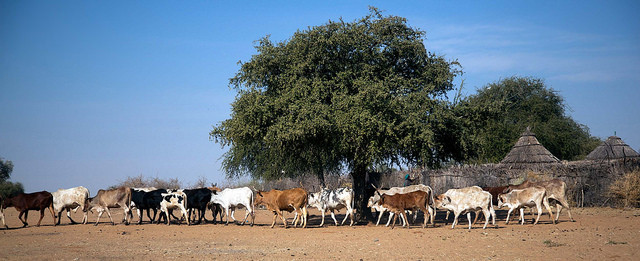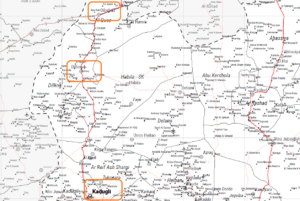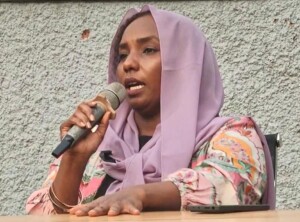Deaths in Darfur in ‘a new wave of attacks’ by herders, RSF, and gunmen

Cattle in Demeika village, North Darfur (File photo: Albert González Farran / UNAMID)
Armed herders opened fire on a North Darfur government delegation in the countryside north-east of El Fasher. North Darfuris also protested against frequent armed robberies and attacks. Um Dafug in South Darfur witnessed tension after three people were killed by the infamous Rapid Support Forces (RSF) whilst East Darfur also witnessed the killing of a market guard.
Farmers told Radio Dabanga that a joint delegation of the Shepherds and Nomads Commission and the Committee for the Protection of the Agricultural Season was on its way to investigate reports about armed herdsmen releasing their cattle into farms in the areas of Seila Jadeedelseil, El Sahel, Um Meraheik, Azragfa, Gegojfo, and Fashar.
The delegation had to return to El Fasher and gain military protection before removing the livestock from the farms.
The Omda of the area of Seila, Ahmed Abdelgader, said that the cows destroyed crops in a number of farms. The Omda called on the North Darfur government to deal with the matter within a maximum period of 24 hours and threatened to take action against the herders if the government does not intervene.
A month ago, Radio Dabanga reported on the deteriorating security situation in North Darfur as herders destroyed the crops of displaced farmers by letting their cattle graze on their lands. The displaced farmers are also frequently subjected to rape and attacks.
In the past, there used to be clearly marked pasture tracks and traditional tribal procedures for herding practices and the compensation of lost crops for farmers, but this changed during the regime of Omar Al Bashir. The regime supported the ‘Arab’ herding tribes in the region, whilst looking down on non-Arab ‘Africans’, often sedentary farmers.
As a result, Darfur has a long history of strife between nomadic Arab herders and non-Arab African herders or sedentary farmers. Arab tribesmen were recruited by the previous regime of dictator Omar Al Bashir to join the Janjaweed militias. Al Bashir employed these Arab militias to repress a revolt over ethnic marginalisation in the region, mainly targeting non-Arab African farmers in what became known as the Darfur Genocide. Many of these farmers still live in camps for the displaced.

Saraf Omra protest
Saraf Omra in North Darfur witnessed relative calm on Sunday after protests against the killing of a man in an armed robbery near the town two days before. The town’s market partially re-opened.
On Saturday, a large number of people gathered in front of the Saraf Omra Rural Hospital and closed the town market. They demanded the arrest of the killers and the restoration of security in the area.
Participants in the protests carried banners denouncing the recurrent attacks and armed robberies, of which the last one claimed the life of Abdellatif Hasan on his way back from Birkat Seira to Saraf Omra on Friday.

RSF in Um Dafug
On Sunday, Um Dafug in South Darfur witnessed tension and the closure of the town’s market, following the killing of two people and the wounding of a woman by paramilitaries of the RSF on Saturday.
Speaking to Radio Dabanga, a listener said that an RSF force arrived in the town last week “to combat what it called ‘negative phenomena’”.
On Saturday, members of the force chased three armed men on a motorcycle and shot them. Two were killed instantly. The third one was detained. A woman passing by was hit by a stray bullet.
The source warned of the outbreak of protests against the violence, demanding the removal of the RSF force and the release of the detainee. He said that the force had now moved to the outskirts of the town.
Yesterday, Radio Dabanga reported that the death toll from attacks on villages in Beleil, also South Darfur, reached at least 15. The local government imposed a state of emergency and a curfew.
Sultan of the Daju tribe Jaafar Adam Ibrahim said that the victims hold the RSF responsible for the attacks and demand their removal from the area.
One of the leaders of the Daju, Saleh Eisa, described the attackers as “organised militiamen backed by government forces who arrived in four-wheel drive vehicles and on motorcycles, camels, and horses.”
East Darfur killing
Shop owners in the livestock market of Ed Daein, the capital of East Darfur, closed the market in protest against the killing of a market guard on Sunday. The man, aged 32, was shot dead on Saturday evening.
The Ed Daein Market Traders Association announced the closure of the entire market “until the state security committee has investigated the killing and previous attacks, enhanced security, and preserves the lives of the people”.
Traders told Radio Dabanga that the market repeatedly witnesses robberies, while the police and other security forces “are almost completely absent”.
On December 14, Radio Dabanga reported a number of attacks on civilians by armed men in Darfur. “A new wave of attacks on civilians in Darfur since mid-November 2021 highlights the urgent need for the UN to enhance its scrutiny of the restive region of Sudan,” said Human Rights Watch in a statement the day after.











 and then
and then